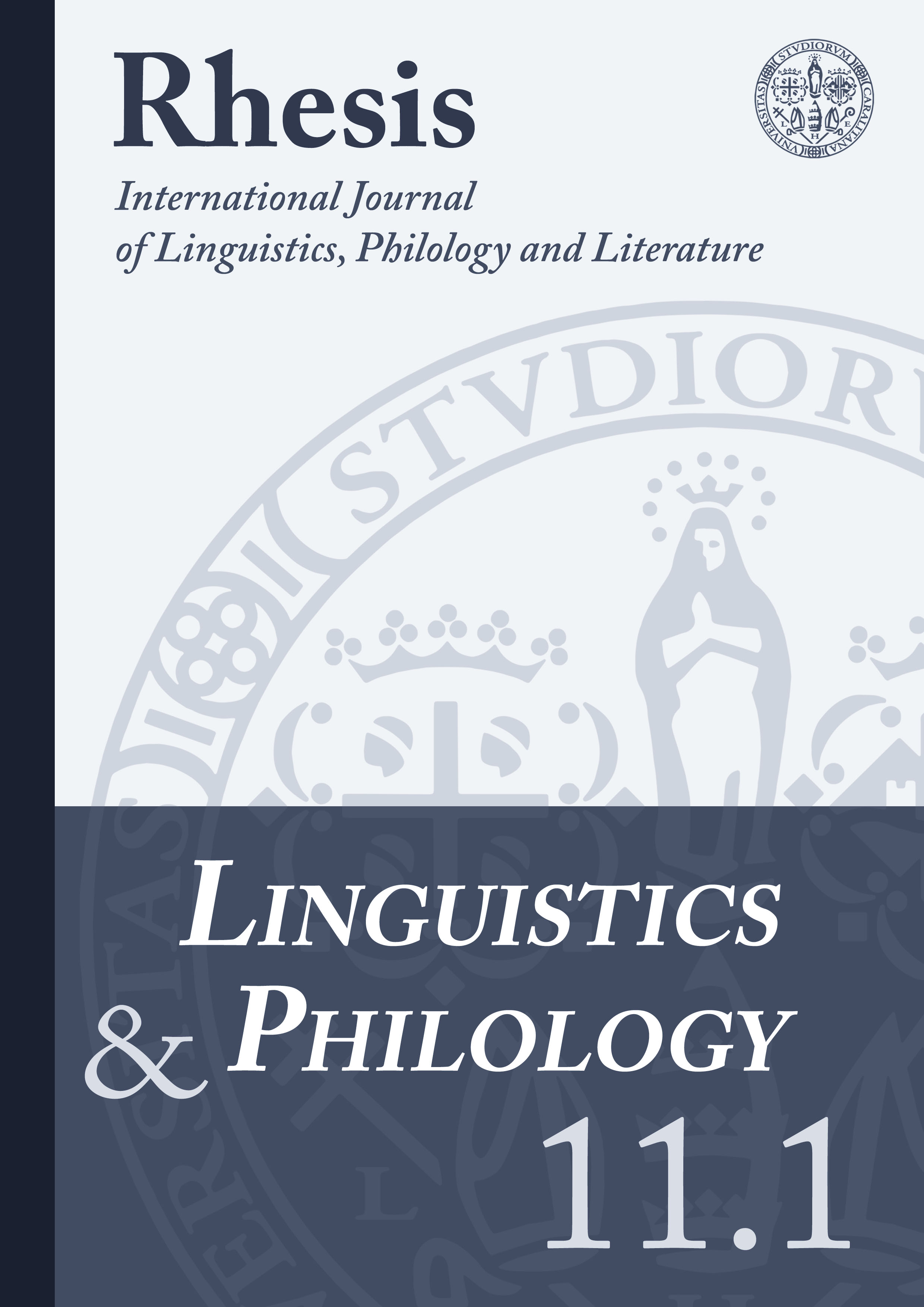Come smascherare un testamento manipolato? Il ricorso agli elementi circostanziali nelle orazioni giudiziarie di Iseo
Abstract
In fourth-century Athens, a man without legitimate male issue can appoint an heir through an inter vivos adoption or a post mortem will. If the former method guarantees a certain reliability thanks to the public recognition of the adopted, the latter suffers from a greater weakness since it was usually kept secret until the man’s death. Whenever there is any suspicion that provisions have been altered and do not match the original wishes of the deceased, Isaios, an expert logographer in inheritance lawsuits, relies on rhetorical argumentation to detect whether the document has indeed undergone manipulation and to reconstruct the most plausible context of facts. In defence of his client, the speaker dismantles the claims of other dubious aspirants for the inheritance, by verifying compliance with legal clauses in the drawing up of the will and by evaluating potential falsification or downright forgery during its transmission. It would therefore be reductive to consider Isaios’ techne exclusively as a tool intended to gain favour with the judges; instead, his rhetorical means can represent a useful strategy to unmask any bluffs and to offer the most likely reconstruction of past events.
Downloads
References
Asheri, David (1963), ‘Laws of Inheritance, Distribution of Land and Political Constitutions in Ancient Greece’, Historia 12, 1-21.
Aujac, Germaine (1978), Denys d’Halicarnasse. Opuscules rhétoriques, 1, Paris, Les Belles Lettres.
Avramović, Sima (1997), Iseo e il diritto attico, Napoli, Jovene.
Bearzot, Cinzia S. (2007), ‘Diritto e retorica nella democrazia ateniese’, Etica & Politica 9 (1), 113-134.
Biscardi, Arnaldo (1982), Diritto greco antico, Varese, Giuffrè.
Carey, Christopher (1994), ‘“Artless” Proofs in Aristotle and the Orators’, Bulletin of the Institute of Classical Studies 39, 95-106.
Carey, Christopher (1996), ‘Nomosin Attic Rhetoric and Oratory’, The Journal of Hellenic Studies 116, 33-46.
Cobetto Ghiggia, Pietro (2012), Iseo. Orazioni, Alessandria, Edizioni dell’Orso.
Cohen, David (1995), Law, Violence and Community in Classical Athens, Cambridge, Cambridge University Press.
Cox, Cheryl A. (2007), ‘The Astynomoi, Private Wills and Street Activity’, The Classical Quarterly 56 (2), 769-775.
Edwards, Michael (2007), Isaeus, Austin, University of Texas Press.
Faraguna, Michele (2006), ‘Tra oralità e scrittura. Diritto e forme della comunicazione dai poemi omerici a Teofrasto’, Dike 9, 63-91.
Ferrucci, Stefano (1998), L’Atene di Iseo, Pisa, ETS.
Ferrucci, Stefano (2005), Iseo. La successione di Kiron, Pisa, ETS.
Ferrucci, Stefano (2006), ‘L’oikos nel diritto attico. Pubblico, privato e individuale nella democrazia ateniese classica’, Dike 9, 183-210.
Ferrucci, Stefano (2007), ‘L’oikos nelle leggi della polis. Il privato ateniese tra diritto e società’, Etica & Politica 9 (1), 135-154.
Ferrucci, Stefano (2011), ‘L’oikos alla sbarra. La rappresentazione dei rapporti familiari nello spazio giuridico ateniese’, Seminari Romani di Cultura Greca 2, 263-284.
Gagarin, Michael (2019), ‘The Use of Witnesses in the Attic Orators’, in Gagliardi, Lorenzo; Pepe, Laura (eds.), Dike. Essays on Greek Law in Honor of Alberto Maffi, Milano, Giuffrè, 131-142.
Gagliardi, Lorenzo (2002), ‘Per un’interpretazione della legge di Solone in materia successoria’, Dike 5, 5-59.
Galaz, Mariateresa (2005), ‘Retórica y argumentación en Iseo’, Acta Poetica 14, 15-32.
Gernet, Louis (1955), Droit et société dans la Grèce ancienne, Paris, Recueil Sirey.
Gernet, Louis (1957), Démosthène. Plaidoyers civils. Tome II (Discours XXXIX-XLVIII), Paris, Les Belles Lettres.
Gontijo, Priscilla (2019), ‘O uso retórico dos testamentos em Iseu: a sucessão do oikos e o cuidado com a família’, Anais do 30° Simpósio Nacional de História – História e o futuro da educação no Brasil / organizador Márcio Ananias Ferreira Vilela. Recife: Associação Nacional de História – ANPUH-Brasil, 1-14.
Griffith-Williams, Brenda (2012), ‘Oikos, Family Feuds and Funerals: Argumentation and Evidence in Athenian Inheritance Disputes’, The Classical Quarterly 62 (1), 145-162.
Griffith-Williams, Brenda (2013), A Commentary on Selected Speeches of Isaios, Leiden, Brill.
Griffith-Williams, Brenda (2016), ‘Rational and Emotional Persuasion in Athenian Inheritance Cases’, in Sanders, Ed; Johncock, Matthew (eds.), Emotion and Persuasion in Classical Antiquity, Stuttgart, Franz Steiner Verlag, 41-55.
Hardcastle, M. (1980), ‘Some Non-legal Arguments in Athenian Inheritance Cases’, Prudentia 12 (1), 11-22.
Harrison, Alick Robin Walsham (1968), The Law of Athens: The Family and Property, 1, Oxford, Oxford University Press.
Hatzilambrou, Rosalia (2011), ‘The Use of the ad hominem Argument in the Works of Isaeus’, L’Antiquité Classique 80, 37-51.
Hatzilambrou, Rosalia (2018), ‘Abuse of Inheritance Law in Isaios?’, in Carey, Chris; Giannadaki, Ifigeneia; Griffith-Williams, Brenda (eds.), Use and Abuse of Law in the Athenian Courts, Leiden, Brill, 336-351.
Kamen, Deborah (2000), Isaeus’ Orations 2 and 6, Bryn Mawr, Thomas Library, Bryn Mawr College. Lambert, Stephen D. (1998) [1993], The Phratries of Attica, Ann Arbor, University of Michigan Press.
Lanni, Adriaan (2006), Law and Justice in the Courts of Classical Athens, Cambridge, Cambridge University Press.
Lanni, Adriaan (2012), ‘Publicity and the Courts of Classical Athens’, Yale Journal of Law & Humanities 24, 119-135.
Leão, Delfim F. (2005), ‘Sólon e a legislação em matéria de direito familiar’, Dike 8, 5-31.
Leão, Delfim F.; Rhodes, Peter J. (2015), The Laws of Solon, London-New York, I. B. Tauris.
Loddo, Laura (2018), Solone demotikotatos. Il legislatore e il politico nella cultura democratica ateniese, Milano, LED.
MacDowell, Douglas M. (1989), ‘The Oikos in Athenian Law’, The Classical Quarterly 39, 10-21.
Palau Cataldi, Annaclara (1976), ‘Ripetizioni come espediente oratorio in Iseo’, Aevum 50 (1), 137-141.
Poddighe, Elisabetta (2014), Aristotele, Atene e le metamorfosi dell’idea democratica. Da Solone a Pericle (594-451 a.C.), Roma, Carocci.
Poddighe, Elisabetta (2020), Aristotele e il synoran. La visione globale tra politica e storia, tra retorica e diritto, Milano, Franco Angeli.
Rhodes, Peter J. (2004), ‘Keeping to the Point’, in Harris, Edward M.; Rubinstein, Lene (eds.), The Law and the Courts in Ancient Greece, London, Duckworth, 137-158.
Rubinstein, Lene (1993), Adoption in IV. Century Athens, København, Museum Tusculanum Press.
Thompson, Wesley E. (1981), ‘Athenian Attitude Toward Wills’, Prudentia 13, 13-25.
Wyse, William (1904), The Speeches of Isaeus, Cambridge, Cambridge University Press.



